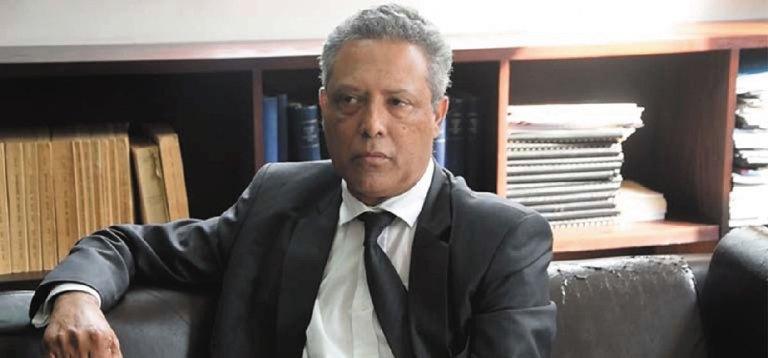Africa-Press – Mauritius. Mauritius Times: We do not know at this stage what the judicial investigation into the suspicious death of activist MSM Soopramanien Kistnen will eventually confirm as to the causes of death, but it will have already revealed to us practices deemed unacceptable by the lawyers of the Kistnen family concerning the safeguarding of the data of the cameras of Safe City or the investigations considered to be hasty in this matter.
The citizen therefore asks questions about his security in the country. How would you respond to that? Mr. Antoine Domingue: It should first be noted that the judicial inquiry was established solely to determine whether or not there was “foul play” in the death of Mr.
Kistnen. As for the questions of Mauritians, they are asking questions of national interest in relation to the safety of everyone. The Safe City project cost Rs 19 billion, and it must be used for something.
The taxpayer is entitled to ask questions, and there needs to be a lot more transparency than there has been so far. I am dismayed to note that the question now being asked is whether the data has been erased.
It would be a shame if that is indeed the case. Already it would be serious if the cameras did not work, but it would be worse if there was any manipulation of the data. We now learn that the police would benefit from a certificate of exemption from the “Data Protection Act”.
Section 44 of this law allows the Prime Minister to exempt another entity, for reasons of national security, from complying with the law regarding the protection of personal data.
If this is indeed the case, it is serious. This is a matter of national interest, and this exemption should be lifted immediately given the prevailing insecurity in the country. Let’s make an assumption.
Under normal circumstances, that is to say with the Safe City without the benefit of an exemption, it would be the responsibility of the ‘Data Protection Office’ to conduct an investigation if a complaint is addressed to it in relation to the manipulation or disappearance of the data, and the case could be referred to the police for investigation.
Does this require an independent and reliable investigation carried out with the assistance or supervision of the Data Protection Commissioner, Ms. Madhub.
It must be understood that we cannot play with the Data Protection Act, because it constitutes one of the foundations, if not one of the pillars of our democracy.
The safeguard of personal data of “Data Subjects” must be an integral part of our right. In this regard, the decision of the Privy Council in the Mahadeo v State of Mauritius 2016 UKPC 30 case is usefully read.
* Rama Valayden said last Thursday that he had information on a body discovered in Caudan, which would be linked to the death of Soopramanien Kistnen.
He also spoke of other suspicious deaths and wonders if there is not “a known squad of power that is at work in Mauritius”. Did he go too far, in your opinion? Rama Valayden is wondering, as is everyone else, including you and me; there are questions that we all ask ourselves.
This is a question that even the Police Commissioner and the DPP or even the head of the NIU should be asking! I don’t see anything abnormal about asking this question in light of the “pattern” that is emerging in front of us.
In the past, we asked ourselves the same question when there were several cases of robberies and assaults in several regions of the country until we managed to get our hands on all the members of the ‘former “Death Squad” most of whom preferred to kill themselves with poison in Albion rather than surrender to the police, one of whom is a fugitive via Madagascar and two others served in prison, and one of ‘They, being involved in the Gorah Issac affair, are now abroad.
So, it’s quite normal to ask these questions, especially since we found another corpse on the beach of Gris Gris, too, involved in the “supply chain” of the State .
.
.
! It is not known if there is a link between these deaths, but it is quite legitimate to ask these questions, especially when there has been a death of a man.
Police investigators, in particular this specialized division that is the MCIT, should therefore also ask themselves this question and not leave this to their colleagues, much less experienced from the Moka CID!
* You have just mentioned the existence of a “pattern” in these different cases of death .
.
. Of course there is a ‘pattern’.
The question now is whether this is an accidental “pattern”, but it would all be a “very strange coincidence” as these suspicious deaths have all formed part of the state’s “supply chain”. It is clear that there can be no “strange coincidence”. Some have wrongly referred to the existence of “state terrorism”.
I wouldn’t say that we went back to the Sheik Hossen / Bedos affair of the 1980s where the State Security Service (SSS) was falsely accused of having planned the death of a man and the burning of the newspaper’s premises.
The Mauritian in order to silence the new ‘offset’ press which would supposedly transform the media landscape in favor of the MMM. From working alongside Sir Gaëtan Duval QC in the judicial investigation from start to finish, I know what to expect.
The judicial investigation into this case, entrusted to investigating magistrate Namdarkhan, would demolish all the grotesque fabrications of Sheik Hossen and Bedos, contrary to what was then claimed in Parliament at the time by Paul Bérenger.
All the same, we must pay tribute to Bérenger who later conceded that he was seriously mistaken in believing the fabrications of Sheik Hossen. So I wouldn’t go so far as to say that this is “state terrorism”, but rather the work of the mafia, that is, the manifestation of organized crime.
The trail should lead the MCIT straight to the top of the state’s supply chain . . . especially during the lockdown period. * It would be dangerous if citizens were to gradually lose confidence in the country’s institutions, especially the police and the judiciary, right?
We can and should trust to a certain point . . . It’s like everything. But the institutions should be above suspicion. However, it is rare that they are.
I won’t go so far as to trust them blindly, but we do have to give the benefit of the doubt, at least until the contrary is established. Everyone knows that there are a few bad apples in all trades. But we should not throw mud on all the police in the country if a few lawyers have been lynched in Rose-Belle, for example.
But it is up to whoever is in charge of the police, who is supposed to be a disciplined force falling under the direct responsibility of the Commissioner of Police and the Disciplined Forces Service Commission, to act.
If it turns out that the two are incapable of maintaining discipline within the police, that would be a shame! What about the Independent Police Complaints Commission chaired by former Supreme Court Justice Ms.
Beesoondoyal? * According to the press, the new Police Commissioner would have expressed his desire to see the police force pull itself together. This statement implies that he is not entirely satisfied with the current state of affairs.
Do you think that the constitutional protection conferred on the Police Commissioner should allow him to take any decision that is necessary from his point of view and in complete independence?
He has just assumed the post of Police Superintendent, and we cannot hold him against him too much.
But I expect him to initiate proceedings in, to cite one example, the lynching of defense lawyers in Rose-Belle and take disciplinary action against the lynchers. This is the least you should be able to expect from a Police Commissioner!
Regarding the constitutional protection he enjoys, this should allow him to take the necessary decisions, so that law and order can be reestablished within the police force itself .
.
.
! One need only refer to the way in which former Police Commissioner Bhardwaz Juggernauth ran the police force in his day.
“He was leading from the front, not from the rear! “. And he had a strong sense of discipline.
And, while the police force had much less manpower, he did not hesitate to suspend a good dozen police officers each month for the sake of maintaining order and discipline in a state body supposed to be a “disciplined” force.
If I were in the place of the Police Commissioner and we end up in a situation where the personal data from the Safe City cameras have disappeared “I would have got to the bottom of it fairly quickly and I would have taken immediate action… ”
* The Prime Minister undoubtedly wanted to deny everything that is currently being said about the Kistnen affair, on Thursday December 10, that Minister Yogida Sawmynaden is “the victim of a cabal”.
Pravind Jugnauth was also to add that he came to this conclusion thanks to a parallel investigation he conducted. Does the Prime Minister have the powers and the means to conduct a parallel investigation in a criminal case?
The answer is clearly NO . . . It is up to the institutions to play their role; he has no investigative power; he only has the powers granted to him by the Constitution; among other things, he chairs the cabinet every Friday. Final point.
Do you see the Prime Minister with investigative powers under the “Police Act”? According to the Constitution, all powers with regard to investigations are vested in the Police Commissioner, and it is for the Prime Minister to formulate ‘policy decisions’ and budget allocations; it has nothing to do with the command of the police force which resides entirely in the hands of the Police Commissioner (see “s71 (2) of the constitution”).
Moreover, if you want to get started as a private detective, as a “Private Eye”, you must absolutely have a permit issued by the Commissioner of Police. As far as I know, the Prime Minister does not have such a license that allows him to play Sherlock Holmes.
His words are absurd… No one can make an investigation or declare himself an investigator without a private detective’s license granted by the Police Commissioner.
Read “s20 (3) of the ‘Police Act'”: “Where the Commissioner is satisfied that the applicant can properly conduct the business of private investigations, he may, with the approval of the Minister and subject to such conditions as he thinks fit to impose, issue a license to the applicant ”. So what is this parallel investigation that the Prime Minister is talking about? It doesn’t exist, except in his imagination!
* Do you have any concerns that this statement by the Prime Minister may have an influence on the still ongoing judicial investigation or any other new police investigation that may be opened in this case?
It cannot have any influence; there is no risk that it will have any effect on anyone.
If the Prime Minister allegedly conducted a parallel investigation, as he claims, why will he not testify in court as a licensed investigator? Who are the people he interviewed? What are the results of his parallel investigation? Did he find suicide and, if so, on what basis? Let him testify before the magistrate in charge of the judicial inquiry into the death of Mr.
Kistnen! I have already had the opportunity to say to Pravind Jugnauth, without mince words, when I was still his lawyer in the ICAC vs PK Jugnauth case: “You are a lawyer, you are the leader of a party and you want to become Prime Minister… it is a legitimate ambition, but you are obliged to ensure respect for the law… ”
I told him this after his return from England to retain the services of Miss Claire Montgomery QC, and this, shortly after the attempted abduction of the DPP by the police, an incident which “by a very strange coincidence indeed Was carried out the very morning of the day he was sentenced to one year in prison.
He had retained my services to represent him in Intermediate Court in order to prepare and submit to the court his reasons for appeals so that he could be released on bail after the prison sentence.
While receiving a one-year jail sentence, the police attempted to capture the DPP completely illegally from his home behind Angus Road, with a CCID squad being – for that – provided with an arrest warrant illegally issued by a magistrate who was on leave .
.
. So don’t you see that from that moment on, we all fell into a state of lawlessness? Personally, I see nothing that can surprise me more . . .
if we even tried to arrest the DPP with a ‘warrant to apprehend’ illegally issued by a magistrate on leave who was forced to resign following an investigation which was made by the Supreme Court… I must tell you that I then immediately demanded, in my capacity as President of the Bar Council, that an investigation be carried out by the Master of the Supreme Court.
The court complied immediately, and the results of the investigation were devastating for the magistrate, now appointed to an important post by those in power. See in what kind of country our fellow citizens are obliged to live!
* If the DPP has found it necessary to institute a judicial inquiry to shed light on the death of Soopramanien Kistnen, it is probably because of the gray areas surrounding the case as highlighted in the press. That’s it ?
The DPP is obliged to quickly make this kind of judicial investigation because there are reasons to question the validity of the hasty conclusion of the CID of Moka that it was a suicide and for that all the light is made transparently.
The magistrate will therefore be called upon to conclude between the thesis of suicide adopted by the CID district or that of “foul play” (of a criminal act) which is that of the widow of the deceased.
Whether we adopt either the foul play ’thesis or the suicide thesis, we must know the reasons behind this conclusion. If the ‘foul play’ thesis is accepted by the court, the MCIT will have to identify all those responsible for it and bring them to justice.
With the Safe City cameras costing Rs19 billion, we should have been much better informed about what really happened. However, instead of being in a ‘Safe Island’ with Safe City cameras on every street corner, we are all in danger of death, despite the massive injection of around Rs19 billion, at the expense of the Mauritian taxpayers.
Do you share the view that there is something fundamentally flawed in the country when allegations are made against a government minister in a criminal case and a former police commissioner is ordered by the Supreme Court to appear? to the Central CID to give explanations probably “under warning” in an investigation concerning the granting of a passport to a drug trafficker?
It’s more serious than that. He is a hard drug dealer who allegedly misplaced his passport and asked the police for a new passport to replace the old one.
I do not see why the Commissioner of Police had to interfere in this personally. All he had to do was let his officers at the Passport Immigration Office (PIO) complete their investigations into this individual’s background.
What does the Disciplined Forces Service Commission do? Was she not empowered to exercise her disciplinary powers over the Police Commissioner? If the Commissioner himself is to be disciplined, then shouldn’t someone make the decision to do so?
Remember the case of Raj Dayal, who was removed from his post as Police Commissioner by a ‘Constitutional Tribunal’ chaired by the late former Chief Justice Rajsoomer Lallah, the future Chief Justice Matadeen and the future Acting Chief Justice Lam Shang Leen .
* “Nobody is above the law .
.
.
” Even the king is “sub Deo et lege”: “under God and the law”. There are some in Mauritius who think they are above the law.
Some may enjoy immunity, such as the President of the Republic. In the case of the Commissioner of Police, there is no immunity. Even those who enjoy immunity do not enjoy impunity.
The Supreme Court has already had the opportunity to recall this principle – sub Deo et lege ‘- when the former President of the Republic, Cassam Uteem, had been “taken to task” for having made inappropriate comments in the press concerning a case that was before the Supreme Court.
He had incurred the censorship of the Supreme Court which had decreed, with reason, that “although he was immune from legal process, he was not immune from legitimate criticism”.







